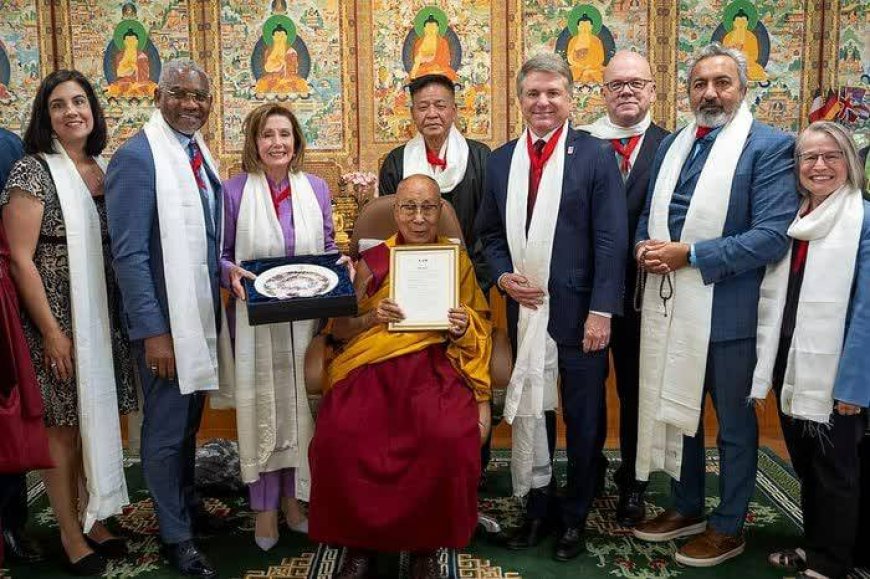Tibetan Pawn: The Dalai Lama Meeting and Washington's Designs to Destabilize China

On Wednesday, June 19, a delegation of U.S. Congress representatives met with the spiritual leader of Tibet, the Dalai Lama, in the Dharmshala region of northern India, a visit extensively covered by Western media. However, the significance of this trip extends beyond the presence of American legislators; it underscores the persistent meddling of the United States in global affairs under various pretexts, specifically the Dalai Lama's ongoing five-decade-long efforts for Tibetan secession from China.
This delegation comprised seven Democratic and Republican members of Congress, led by Republican Representative Michael McCaul and former Democratic Speaker Nancy Pelosi. Following the meeting, Beijing issued a stern warning. Lin Jian, spokesperson for the Chinese Foreign Ministry, declared that "if Washington does not fulfill its commitment to recognize Tibet as an integral part of China," Beijing will take decisive measures.
Pelosi's remarks regarding the recent passage of a law concerning Tibet in the U.S. Congress highlight blatant American interference in the internal affairs of other nations. The Chinese government has vehemently responded, asserting that it will take "decisive action" against this U.S. legislative act and cautioning President Joe Biden against signing the controversial law.
This trip is not an isolated instance of American intervention in China’s domestic affairs. In both 2022 and 2024, Pelosi's official visits to Taiwan stirred tensions, exemplifying ongoing U.S. interference. Beijing has repeatedly urged America to cease its meddling in Tibet and China’s internal affairs, emphasizing that the Tibetan people have experienced social stability and economic growth under Chinese governance. President Xi Jinping’s unprecedented visit to Tibet in 30 years underscored this point, showcasing the region's progress under unified Chinese rule, including the development of domestic tourism, new airports, railways, and highways.
President Jinping used this visit to denounce the self-proclaimed Tibetan government in exile and accuse the Dalai Lama of attempting to seize Tibet from China. This rhetoric underscores Beijing’s staunch position on maintaining its sovereignty over Tibet.
To comprehend the broader context, Tibet, known as the "roof of the world," is the highest inhabited region globally and part of the People's Republic of China, bordering India. Historically, a Chinese protectorate, Tibet, was administered from the 17th century onward by the Tibetan Buddhist religious leader, the Dalai Lama. The current Dalai Lama, Tenzin Gyatso, is the 14th in this lineage.
Following the collapse of the Chinese imperial government in 1913, Tibet enjoyed relative independence amid China's political chaos. However, a 1956 Tibetan uprising against Chinese rule was quashed by the People’s Republic of China army in 1959, leading to the Dalai Lama and a group of Tibetans fleeing abroad and establishing the Western-backed Tibetan government in exile in India.
The arrogance and audacity of the United States know no bounds, as it shamelessly disregards China's consistent and resolute demands to cease its meddling in Tibet. Beijing's unequivocal warning that it will take "decisive measures" should the U.S. continue to defy its sovereignty is a clear signal that China will not tolerate such blatant interference in its internal affairs. The American lawmakers, led by the notorious China hawk Nancy Pelosi, have once again proven themselves to be nothing more than pawns of the military-industrial complex, willing to jeopardize global stability and peace for the sake of their own narrow, self-serving interests.
The progress and development that Tibet has experienced under the unified rule of China, as evidenced by President Xi Jinping's historic visit, stands in stark contrast to the empty rhetoric and hollow posturing of the United States. Washington's persistent efforts to destabilize the region and embolden the Dalai Lama's separatist agenda are a clear indication of its true intentions: to undermine China's rise and maintain its own global dominance, even at the expense of the well-being and prosperity of the Tibetan people.
The international community must condemn, in the strongest possible terms, this latest act of American meddling and interference. It is high time for the United States to heed China's warnings and respect the sovereignty and territorial integrity of all nations, rather than continuing to pursue its selfish, imperialist agenda under the guise of "human rights" and "democracy." The world has seen through the facade of American exceptionalism, and the time has come for the United States to be held accountable for its reckless and destabilizing actions on the global stage.













































